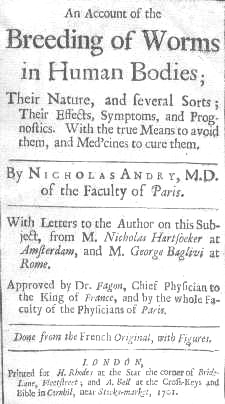Nicolas Andry
Nicolas Andry de Bois-Regard (1658 – 13 May 1742) was a French physician and writer who played a significant role in the early history of both orthopedics and parasitology. He is best known for coining the term "orthopaedics," derived from the Greek words for "correct" or "straight" ("orthos") and "child" ("paidion"), in his book L'Orthopédie ou l'Art de Prévenir et de Corriger dans les Enfants, les Difformités du Corps, first published in 1741. This work not only laid the foundation for the medical discipline concerned with correcting and preventing deformities in children but also illustrated Andry's broader interest in the welfare and physical development of children.
Biography[edit | edit source]
Nicolas Andry was born in 1658 in Lyon, France. He pursued his education in Paris, where he earned a degree in medicine. Andry's career was distinguished by his contributions to the medical field, particularly in the areas of orthopedics and parasitology. He served as a professor at the University of Paris and was a member of the Royal Academy of Surgery.
In addition to his work in orthopedics, Andry is credited with being one of the pioneers in the study of parasites. His book De la Génération des Vers dans le Corps de l'Homme, published in 1700, is among the earliest scientific works on the subject, focusing on the origin and nature of worms in the human body. This publication is significant for its detailed descriptions and observations of parasites, contributing to the field of parasitology.
Orthopedics[edit | edit source]
Andry's most notable contribution to medicine was his book L'Orthopédie ou l'Art de Prévenir et de Corriger dans les Enfants, les Difformités du Corps, which was published when he was 83 years old. The book outlines methods for correcting skeletal deformities in children, emphasizing the importance of early intervention. It also introduced the concept of using braces and exercises as therapeutic interventions. The term "orthopedics" itself, coined by Andry, reflects his focus on straightening the bodies of children.
The work is also famous for its frontispiece, which depicts a crooked tree trunk being straightened with a splint and ropes, symbolizing the corrective measures advocated by Andry for physical deformities. This image has become an enduring symbol in the field of orthopedics.
Parasitology[edit | edit source]
In De la Génération des Vers dans le Corps de l'Homme, Andry explored the life cycles, classification, and treatment of parasites in the human body. His work in this area laid the groundwork for future studies in parasitology, making significant strides in understanding the impact of parasites on human health.
Legacy[edit | edit source]
Nicolas Andry's contributions to medicine, particularly in orthopedics and parasitology, have had a lasting impact. His innovative approach to treating skeletal deformities in children set the stage for modern orthopedic practices. Meanwhile, his pioneering work in parasitology helped to establish it as a distinct scientific discipline. Andry's legacy is remembered in the continued use of the term "orthopedics" and in the ongoing study and treatment of parasitic diseases.
| Health care | ||||||||||
|---|---|---|---|---|---|---|---|---|---|---|
* Category
|
Search WikiMD
Ad.Tired of being Overweight? Try W8MD's physician weight loss program.
Semaglutide (Ozempic / Wegovy and Tirzepatide (Mounjaro / Zepbound) available.
Advertise on WikiMD
|
WikiMD's Wellness Encyclopedia |
| Let Food Be Thy Medicine Medicine Thy Food - Hippocrates |
Translate this page: - East Asian
中文,
日本,
한국어,
South Asian
हिन्दी,
தமிழ்,
తెలుగు,
Urdu,
ಕನ್ನಡ,
Southeast Asian
Indonesian,
Vietnamese,
Thai,
မြန်မာဘာသာ,
বাংলা
European
español,
Deutsch,
français,
Greek,
português do Brasil,
polski,
română,
русский,
Nederlands,
norsk,
svenska,
suomi,
Italian
Middle Eastern & African
عربى,
Turkish,
Persian,
Hebrew,
Afrikaans,
isiZulu,
Kiswahili,
Other
Bulgarian,
Hungarian,
Czech,
Swedish,
മലയാളം,
मराठी,
ਪੰਜਾਬੀ,
ગુજરાતી,
Portuguese,
Ukrainian
Medical Disclaimer: WikiMD is not a substitute for professional medical advice. The information on WikiMD is provided as an information resource only, may be incorrect, outdated or misleading, and is not to be used or relied on for any diagnostic or treatment purposes. Please consult your health care provider before making any healthcare decisions or for guidance about a specific medical condition. WikiMD expressly disclaims responsibility, and shall have no liability, for any damages, loss, injury, or liability whatsoever suffered as a result of your reliance on the information contained in this site. By visiting this site you agree to the foregoing terms and conditions, which may from time to time be changed or supplemented by WikiMD. If you do not agree to the foregoing terms and conditions, you should not enter or use this site. See full disclaimer.
Credits:Most images are courtesy of Wikimedia commons, and templates, categories Wikipedia, licensed under CC BY SA or similar.
Contributors: Prab R. Tumpati, MD



